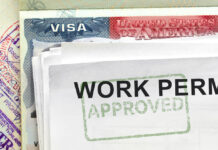Our 45th President Donald J. Trump says he will stop undocumented immigrants from entering the U.S. and deport those already here. For this reason, and even though details are mostly lacking, Trump seems hell-bent to fulfill his campaign promises.
If you’re an employer, you need to get up to speed on E-Verify — what it means to you and what may be on the program’s horizon. Now is an especially dangerous time to be investigated for having undocumented workers on your payroll, intentionally or otherwise.
E-Verify was originally established in 1997 as the “Basic Pilot Program.” The government took the action to prevent undocumented immigrants from obtaining employment in the U.S. In 2007, the U.S. Department of Homeland Security updated and renamed the program E-Verify. At that time, it also began requiring all federal contractors and vendors to use the program.
E-Verify, a partnership of the DHS and the Social Security Administration, compares information from an employee’s Employment Eligibility Verification Form I-9 to data from thousands of U.S. government records to confirm employment eligibility.
Mish-mash of state rules.
Not every employer in the U.S. is required to use E-Verify. The federal government has left it up individual states to decide which employers must use E-Verify. However, powerful interests — both within Congress and outside of the government — continue to push for a law to require practically every employer in the nation to use it.
Opposing views.
In recent years, both Rep. Lamar Smith (R -Texas) and Sen. Chuck Grassley (R-Iowa) have initiated legislation to take the employee eligibility program national. Neither effort made it to the floor for a vote.
Not everyone agrees that mandating E-Verify for all U.S. employers is a good idea — far from it. The U.S. Chamber of Commerce and many industry groups oppose the idea. The CATO Institute is likewise skeptical that mandating E-Verify nationally will solve the undocumented worker issue. CATO has gone on record disputing the government-touted accuracy of E-Verify in identifying illegal workers.
“E-Verify is a notoriously error- prone and unreliable system,” CATO claims. “E-Verify imposes a large economic cost on American workers and employers, does little to halt unlawful immigration because it fails to turn off the ‘jobs magnet,’ and is an expansionary threat to American liberties.”
Whether you are pro or con E-Verify, it’s hard to ignore the political heat being directed at the large number of undocumented immigrants in the U.S. and the claims (justified or not) that they are taking jobs U.S. citizens want and keeping wages lower than they should be in many occupations.
As of 2014, the Pew Research Center says there are approximately 11 million undocumented immigrants in the U.S. About 8 million are either working or they’re looking for work. This number constitutes 5 percent of the U.S. workforce.
Stay up to date on E-Verify.
As an employer, are you knowledgeable about the rules for using E-Verify in the state or states where you are doing business?
Do you realize that, even if your state does not require you to use E-Verify in your hiring process, you have a decision to make about whether to use the program or not, especially if you’re uncertain about a job applicant’s employment eligibility?
E-Verify is free, online and fast. Most employers receive the results of their E-Verify request within a minute or less, according to The U.S. Citizenship and Immigration Services website. More than 600,000 employers “of all sizes” use the program with more than 1,400 new participating companies every week, says the USCIS.











![[VIDEO] Dickies®: Discover Workwear That’s Anything But Uniform](https://turfmagazine.com/wp-content/uploads/2023/06/1647663814-4b1a2a7742790a9b1e97a3b963477850192e1d6a9dfba9b07214a77bae25d6e3-d-218x150.jpg)






























![[VIDEO] Dickies®: Discover Workwear That’s Anything But Uniform](https://turfmagazine.com/wp-content/uploads/2023/06/1647663814-4b1a2a7742790a9b1e97a3b963477850192e1d6a9dfba9b07214a77bae25d6e3-d-324x160.jpg)
Even if you do not use E-verify you need to have workers fill out the I-9 but that is ripe for problems as information given to employers by workers can come from fraudulent documents